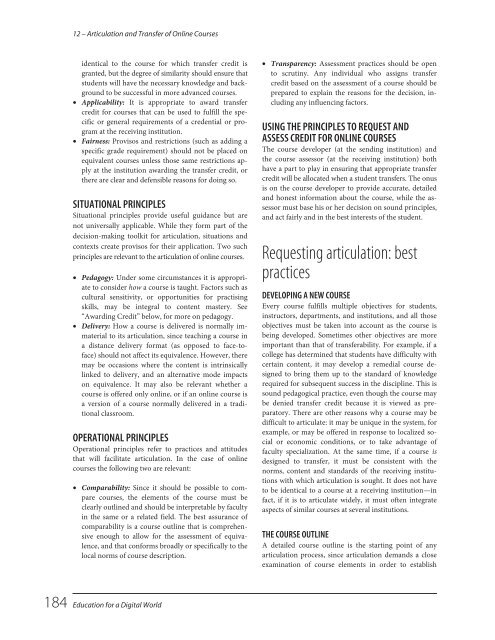Education for a Digital World Advice, Guidelines and Effective Practice from Around Globe, 2008a
Education for a Digital World Advice, Guidelines and Effective Practice from Around Globe, 2008a
Education for a Digital World Advice, Guidelines and Effective Practice from Around Globe, 2008a
You also want an ePaper? Increase the reach of your titles
YUMPU automatically turns print PDFs into web optimized ePapers that Google loves.
12 – Articulation <strong>and</strong> Transfer of Online Courses<br />
identical to the course <strong>for</strong> which transfer credit is<br />
granted, but the degree of similarity should ensure that<br />
students will have the necessary knowledge <strong>and</strong> background<br />
to be successful in more advanced courses.<br />
• Applicability: It is appropriate to award transfer<br />
credit <strong>for</strong> courses that can be used to fulfill the specific<br />
or general requirements of a credential or program<br />
at the receiving institution.<br />
• Fairness: Provisos <strong>and</strong> restrictions (such as adding a<br />
specific grade requirement) should not be placed on<br />
equivalent courses unless those same restrictions apply<br />
at the institution awarding the transfer credit, or<br />
there are clear <strong>and</strong> defensible reasons <strong>for</strong> doing so.<br />
SITUATIONAL PRINCIPLES<br />
Situational principles provide useful guidance but are<br />
not universally applicable. While they <strong>for</strong>m part of the<br />
decision-making toolkit <strong>for</strong> articulation, situations <strong>and</strong><br />
contexts create provisos <strong>for</strong> their application. Two such<br />
principles are relevant to the articulation of online courses.<br />
• Pedagogy: Under some circumstances it is appropriate<br />
to consider how a course is taught. Factors such as<br />
cultural sensitivity, or opportunities <strong>for</strong> practising<br />
skills, may be integral to content mastery. See<br />
“Awarding Credit” below, <strong>for</strong> more on pedagogy.<br />
• Delivery: How a course is delivered is normally immaterial<br />
to its articulation, since teaching a course in<br />
a distance delivery <strong>for</strong>mat (as opposed to face-toface)<br />
should not affect its equivalence. However, there<br />
may be occasions where the content is intrinsically<br />
linked to delivery, <strong>and</strong> an alternative mode impacts<br />
on equivalence. It may also be relevant whether a<br />
course is offered only online, or if an online course is<br />
a version of a course normally delivered in a traditional<br />
classroom.<br />
OPERATIONAL PRINCIPLES<br />
Operational principles refer to practices <strong>and</strong> attitudes<br />
that will facilitate articulation. In the case of online<br />
courses the following two are relevant:<br />
• Comparability: Since it should be possible to compare<br />
courses, the elements of the course must be<br />
clearly outlined <strong>and</strong> should be interpretable by faculty<br />
in the same or a related field. The best assurance of<br />
comparability is a course outline that is comprehensive<br />
enough to allow <strong>for</strong> the assessment of equivalence,<br />
<strong>and</strong> that con<strong>for</strong>ms broadly or specifically to the<br />
local norms of course description.<br />
• Transparency: Assessment practices should be open<br />
to scrutiny. Any individual who assigns transfer<br />
credit based on the assessment of a course should be<br />
prepared to explain the reasons <strong>for</strong> the decision, including<br />
any influencing factors.<br />
USING THE PRINCIPLES TO REQUEST AND<br />
ASSESS CREDIT FOR ONLINE COURSES<br />
The course developer (at the sending institution) <strong>and</strong><br />
the course assessor (at the receiving institution) both<br />
have a part to play in ensuring that appropriate transfer<br />
credit will be allocated when a student transfers. The onus<br />
is on the course developer to provide accurate, detailed<br />
<strong>and</strong> honest in<strong>for</strong>mation about the course, while the assessor<br />
must base his or her decision on sound principles,<br />
<strong>and</strong> act fairly <strong>and</strong> in the best interests of the student.<br />
Requesting articulation: best<br />
practices<br />
DEVELOPING A NEW COURSE<br />
Every course fulfills multiple objectives <strong>for</strong> students,<br />
instructors, departments, <strong>and</strong> institutions, <strong>and</strong> all those<br />
objectives must be taken into account as the course is<br />
being developed. Sometimes other objectives are more<br />
important than that of transferability. For example, if a<br />
college has determined that students have difficulty with<br />
certain content, it may develop a remedial course designed<br />
to bring them up to the st<strong>and</strong>ard of knowledge<br />
required <strong>for</strong> subsequent success in the discipline. This is<br />
sound pedagogical practice, even though the course may<br />
be denied transfer credit because it is viewed as preparatory.<br />
There are other reasons why a course may be<br />
difficult to articulate: it may be unique in the system, <strong>for</strong><br />
example, or may be offered in response to localized social<br />
or economic conditions, or to take advantage of<br />
faculty specialization. At the same time, if a course is<br />
designed to transfer, it must be consistent with the<br />
norms, content <strong>and</strong> st<strong>and</strong>ards of the receiving institutions<br />
with which articulation is sought. It does not have<br />
to be identical to a course at a receiving institution—in<br />
fact, if it is to articulate widely, it must often integrate<br />
aspects of similar courses at several institutions.<br />
THE COURSE OUTLINE<br />
A detailed course outline is the starting point of any<br />
articulation process, since articulation dem<strong>and</strong>s a close<br />
examination of course elements in order to establish<br />
184 <strong>Education</strong> <strong>for</strong> a <strong>Digital</strong> <strong>World</strong>


















